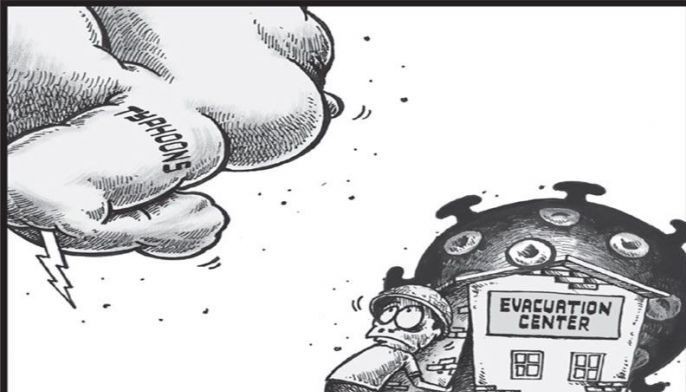In Batangas on June 7, heavy rain in the afternoon turned volcanic ash into mud that inundated Barangay Buso-Buso in Laurel town. Volcanologists have stressed that the mudflow was not lahar, but it nevertheless added to the fear and misery of residents who have not yet fully recovered from the phreatic explosion of Taal Volcano at the start of the year.
In recent days, heavy rains have spawned flooding in Metro Manila and other areas. On Friday, the Philippine Atmospheric, Geophysical and Astronomical Services Administration declared the official start of the rainy season.
While this is normal in the country, the rains are arriving in abnormal times, in the middle of a killer pandemic. Containing the coronavirus disease 2019 calls for sustained social or physical distancing – a task that is certain to be complicated when people displaced by typhoons, torrential flooding and mudslides are forced to flee to cramped evacuation centers.
Several of these evacuation centers – usually school gymnasiums – are currently being used for testing, isolation and quarantine of COVID-19 cases, or for the distribution of aid to hard-hit families.
Tropical Depression Butchoy is just the second storm to hit the country this year. Many others – much more powerful, bringing heavy rains and destructive winds, spawning crippling floods – are expected in the coming months.
In urban centers, the regular downpours and floods will encumber the cyclists whose ranks have increased amid the stringent restrictions on mass transportation. The rainy season is also traditionally flu season, and flu viruses spread rapidly in congested surroundings.
With the onset of the rainy season, every effort must be made to improve flood control. Local government units, especially in the areas facing the Pacific Ocean that serve as the welcome mat for tropical cyclones, must prepare adequate evacuation facilities in case disaster strikes. These facilities must be kept a safe distance away from installations meant for COVID control.
In the absence of a vaccine or cure for COVID-19, physical distancing must continue to be strictly observed, even in evacuation centers. Those who are rescued from devastating typhoons must also be protected from this highly infectious and potentially deadly disease.


